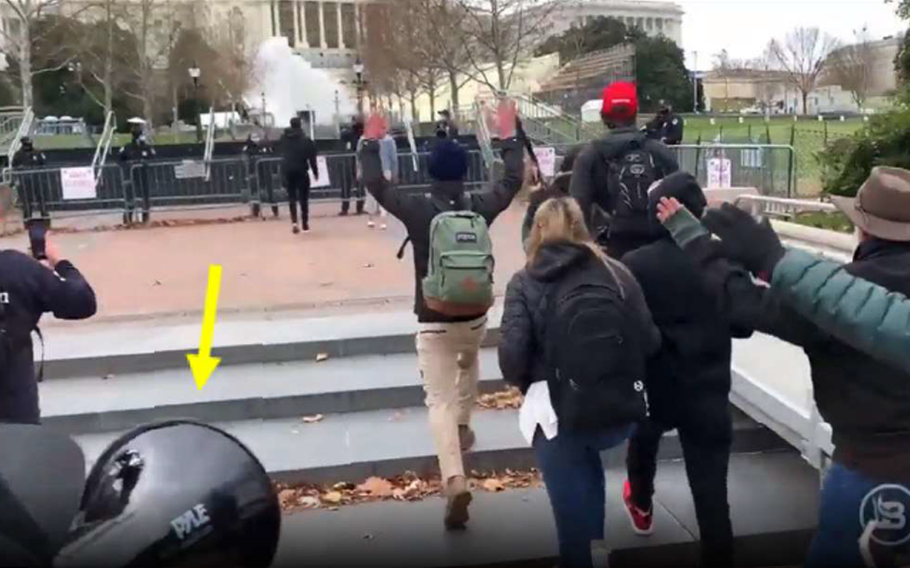
Paul Russell Johnson’s megaphone as he approaches uniformed U.S. Capitol Police officers standing guard at a second line of metal barricades, in a statement of facts released by the U.S. Attorney’s Office for the District of Columbia. (U.S. Attorney for Washington, D.C.)
A Jan. 6 rioter who was convicted of assaulting police with a deadly weapon was sentenced to spend his weekends in jail for the next year, one of the lightest penalties yet imposed on a rioter convicted of attacking law enforcement.
Paul Russell Johnson, 38, of Lanexa, Va., was one of five men who grabbed the bicycle racks being used as barricades by U.S. Capitol Police, lifted them into the air and smashed them into several officers, clearing a path from the Peace Circle to the Capitol for the thousands of Donald Trump supporters marching from the Ellipsis. The five men didn’t know one another, but they went on trial together before U.S. District Judge Jia M. Cobb in October and November, with Cobb convicting them of civil disorder and assault with a deadly weapon — the bike racks.
Video showed that Johnson used a megaphone to recruit men to join him in attacking the police. After lifting the bike racks, Johnson encouraged the crowd to head for the Capitol, where he and his co-defendants traveled, some creating more havoc than others.
Federal sentencing guidelines called for a minimum sentence of five years for Johnson, and prosecutors asked Cobb to give him a nine-year term. But Johnson’s wife suffers from an undisclosed illness and they have three children, which Cobb noted as she diverged from the sentencing guidelines and told Johnson he could report to jail at 5 p.m. on Saturdays and leave on Monday mornings. After the first year, Cobb ordered Johnson to spend two years on home confinement, all as part of a five-year probation sentence.
Cobb then sentenced the next defendant, Steven C. Randolph, 35, of Harrodsburg, Ky., to eight years in prison, one of the stiffest sentences given to any Jan. 6 defendant for assaulting an officer. Cobb said that Randolph picked up the bike rack and pushed it toward Capitol Police Officer Caroline Edwards, who suffered head injuries and lasting migraines. “She could’ve been killed,” the judge said. Then, while Edwards was on the ground, Randolph attacked another officer, video showed.
“The nature of these offenses are as serious as they can be,” Cobb said. Prosecutors asked for a sentence of 11 years for Randolph, but Cobb gave him eight years. Among Jan. 6 defendants convicted of assaulting police, the eight-year sentence is one of the 10 longest, according to a Washington Post database.
Two other defendants were also sentenced Thursday, while the fifth — Ryan Samsel, who was identified within days of Jan. 6 and has been in jail ever since — had his hearing postponed because of medical issues. He is being held in jail in Brooklyn, his lawyer said Thursday.
Cobb sentenced James T. Grant, 32, of Cary, N.C., to three years in prison, and Jason B. Blythe, 29, of Fort Worth, to 2½ years in prison. All five defendants were convicted of civil disorder and assault on police, though Cobb acquitted some defendants on some counts.
“The importance of the entry at Peace Circle cannot be overstated,” Assistant U.S. Attorney Kyle Mirabelli said. “These defendants played a leading role at the first breach and in the attack on police officers. Hundreds of people followed them onto the west front” of the Capitol. “That is what kicked off the riot.”
Prosecutors said in a sentencing memo that “Johnson played a uniquely consequential role in the unprecedented events of Jan. 6” by shouting at the crowd through his megaphone at 1 p.m., while Trump was still speaking at the “Stop the Steal” rally. Johnson mocked the men for not joining the front lines, which Blythe later said was the encouragement he needed to enter the fray.
After the five men lifted the bike racks and knocked Edwards to the ground, where she was briefly unconscious, “Johnson immediately went to work tearing that fence apart,” Assistant U.S. Attorney Hutton Marshall said. “He’s thinking tactically about how he can advance the crowd, how he can facilitate a larger number of people.”
But Johnson’s sentencing memo cited his wife’s illness and an unspecified condition for one of his children. Johnson cried as he told the judge: “I humbly ask you for mercy, for an 11-year-old. I’m sorry for all of this.”
Cobb said she was bothered that Johnson was inciting others. “I understand that Mr. Johnson’s conduct was serious,” the judge said. “Part of my obligation is to consider all of the relevant factors.”
Then she imposed a sentence of weekends in jail, followed by home detention. “I thought it would be too punitive,” Cobb said, “to incarcerate him in a significant fashion, given the medical issues of his wife, familial issues and the custody situation. … In my view, I can fashion a sentence without ruining the life of a family.”
The judge imposed a $25,000 fine, and then Johnson left the courthouse. Blythe and Randolph were ordered into custody, and Grant was already in jail for having been arrested with weapons during his pretrial release.